Speeches Shim
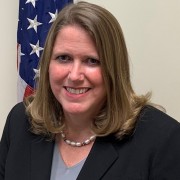
With 20 years of development experience, Ms. Kendra Schoenholz is the Mission Director for USAID/Guinea and Sierra Leone. Before coming to Guinea, Ms. Schoenholz studied at the National War College, earning a Master's degree in national security strategy. In her prior overseas assignment, Ms. Schoenholz served as the Deputy Mission Director in the Democratic Republic of the Congo. In this role, she provided strategic-level programmatic direction and operational oversight for $600 million of development and humanitarian assistance in the DRC. Ms. Schoenholz has also served in Senegal, Iraq, Sudan (now South Sudan), Thailand, Afghanistan, and Cambodia, first as an Auditor with the Office of Inspector General and then as a Controller in the Office of Financial Management. Prior to USAID, Ms. Schoenholz worked for the United Nations Office of Internal Oversight Services as well as Deloitte and Touche, LLP. In addition to the Master's degree in national security strategy, Ms. Schoenholz holds a Master's degree in accounting and a Bachelor’s degree in linguistics.
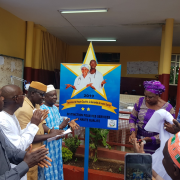
Since 2017, the USAID-funded Health Service Delivery (HSD) project has worked with the Government of Guinea to provide training for health workers across the country and to upgrade medical equipment. This has enabled facilities to provide a higher standard of care. In an effort to empower health workers and enable them to make decisions, solve problems and innovate at the local level, Jhpiego, a USAID partner in the HSD project, has initiated the Standards-Based Management and Recognition process, a proactive, practical management methodology that focuses on the implementation of best practices in health centers.
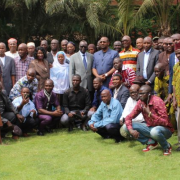
In Guinea, weak infrastructure, a lack of skilled human resources, and inadequate tools are an obstacle to effective animal disease surveillance and early warning. As part of the USAID-funded Global Health Security Agenda, the United Nations Food and Agriculture Organization (FAO) organized a training workshop for officials of the livestock department including 33 regional directors and those of the 5 municipalities of Conakry on an application that enables data collection and real-time reporting at country level of geo-referenced information on animal diseases, facilitating both surveillance and early warning.
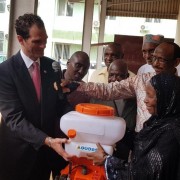
Following the renovation of veterinary laboratories in Guinea and the training of their agents by USAID’s GHSA program, a serological surveillance (a resource to evaluate vaccine programs for diseases) was carried out in the zones at risk. During this surveillance, a low pathogenic strain of avian influenza (H7) was identified in certain poultry farms in Dubréka, Forécariah, Coyah, and Conakry. This new development adding to the low level of bioprompted USAID to provide biosafety equipment and disinfectants to the Ministry of Livestock and Animal Production with the objective of preventing the introduction and dissemination of infectious agents in the poultry production chain. This will boost the poultry sector, which is particularly important for young entrepreneurship and women empowerment.
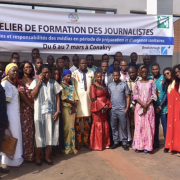
Since the Corona-virus outbreak in January 2020, many countries have been affected, including in West Africa. In order to support preparedness measures in Guinea, the USAID-funded Breakthrough Action project initiated a workshop to strengthen the capacities of the media in health emergencies communication techniques. The two-day workshop was launched on Friday March 06, 2020 at the Riviera Royal Hotel in Conakry. The objective was to provide training for at least 50 journalists from the public and private press on how to communicate in case of major health crises. The training equipped the media to disseminate fair, coherent and reliable information on health emergencies, thereby avoiding unjustified fear among public opinion.


Comment
Make a general inquiry or suggest an improvement.